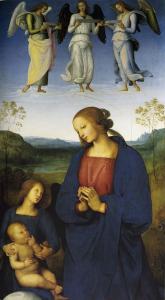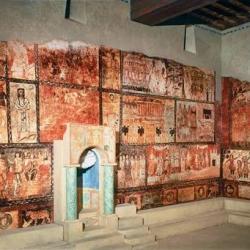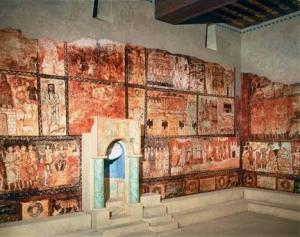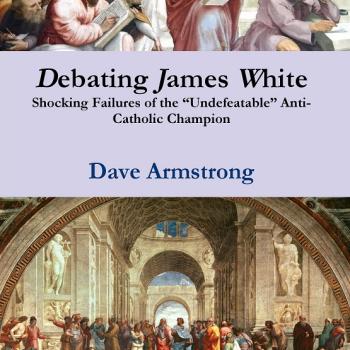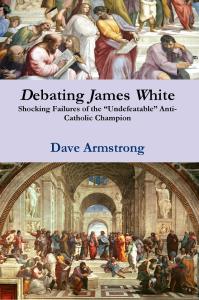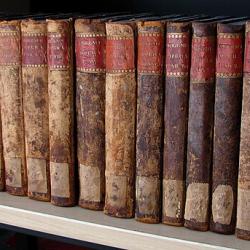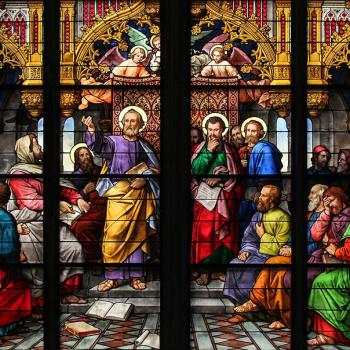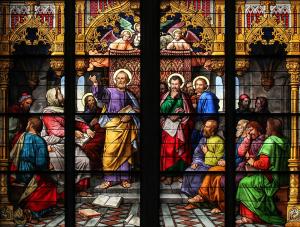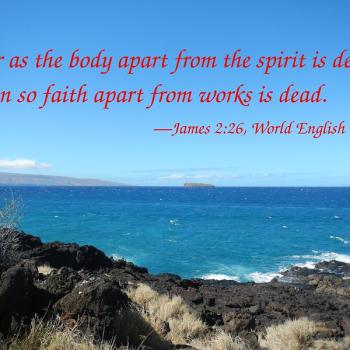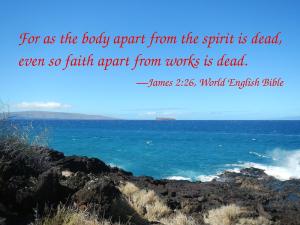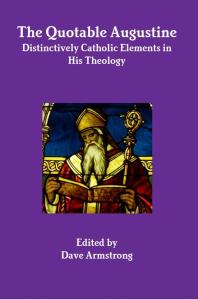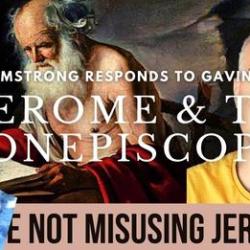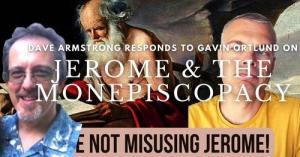“The Other Paul” is an Australian Anglican in his 20s. He runs a ministry with the same name (see his YouTube channel and website). Paul’s particular areas of interest are “biblical exegesis and the first few centuries of early Church history,” but he also addresses “just about any other topic pertaining to Scripture or history.” He also frequently engages in ecumenical dialogue and debate with other Christian traditions, especially Catholics and Orthodox, and is working towards becoming an Anglican clergyman.
I use RSV for Bible verses unless otherwise indicated. Paul’s words will be in blue.
*****
“Please Hit ‘Subscribe’”! If you’ve received benefit from this or any of my 4,500+ articles, please follow this blog by signing up (email address) on the sidebar to the right, above the icon bar, “Sign Me Up!”: to receive notice when I post a new blog article. This is the equivalent of subscribing to a YouTube channel. Please also consider following me on Twitter / X and purchasing one or more of my 55 books. All of this helps me get more exposure and concretely supports my full-time apologetics work. Thanks so much and happy reading!
*****
I am responding to Paul’s video, “Luke 1:28 & The Immaculate Conception – Papist Prooftexts” (12-22-20).
Paul is apparently responding to an article entitled, “The Meaning of Kecharitomene: Full of Grace (Luke 1:28)” by “pfairban”; posted on the Catholic-Convert.com discussion board (my good friend Steve Ray’s old forum). I’ve dealt with this topic in depth several times as well.
1:23 Luke 1:28 . . . [is] translated in the Douay-Rheims and other Catholic versions as “hail full of grace” or gratia plena in the Latin Vulgate.
This is (possibly) an insinuation of implied Catholic translation bias. Whether that is the case or not, not all Catholic versions have “full of grace” at Luke 1:20. The New American Bible (revised) doesn’t, and it’s the most widely used Catholic translation. Nor does the Jerusalem Bible, nor Kleist & Lilly. And here are eleven non-Catholic English translations (well, Wycliffe was Catholic by affiliation, but in many ways a forerunner of Protestantism) that do include it, or some wording with “grace”:
Amplified Bible (Classic Edition, 1954): Hail, O favored one [endued with grace]!
Jubilee Bible 2000: Hail, thou that art much graced
New Matthew Bible (2016): Hail, thou full of grace!
Wycliffe Bible (2001): Hail, full of grace
Tyndale Bible (1526): Hayle full of grace
Coverdale Bible (1535): Hayle thou full of grace
Berean Literal Bible: Greetings, you favored with grace!
Literal Emphasis Translation: Greetings, you favored with grace!
Aramaic Bible in Plain English: Peace to you, full of grace
Lamsa Bible: Peace be to you, O full of grace
Wycliffe Bible (1395): Heil, ful of grace
Granted, this is not the consensus translation, but it is a permissible translation, and I think the charge of “bias” is unwarranted, especially given what Baptist Greek scholar A. T. Roberts on wrote about it:
“Highly favoured” (kecharitomene). Perfect passive participle of charitoo and means endowed with grace (charis), enriched with grace as in Ephesians. 1:6, . . . The Vulgate gratiae plena “is right, if it means ‘full of grace which thou hast received’; wrong, if it means ‘full of grace which thou hast to bestow‘” (Plummer). (Word Pictures in the New Testament, Nashville: Broadman Press, 1930, 6 volumes, Vol. II, 13)
Likewise, Greek scholar Marvin Vincent noted that the literal meaning of kecharitomene is “endued with grace” (Word Studies in the New Testament, Grand Rapids, Michigan: Eerdmans, 1946, four volumes, from 1887 edition [New York: Charles Scribner’s Sons], Vol. I, 259). Well-known Protestant linguist W. E. Vine also concurs, and defines it as “to endue with Divine favour or grace” (An Expository Dictionary of New Testament Words, Old Tappan, New Jersey: Fleming H. Revell Co., four volumes-in-one edition, 1940, Vol. II, 171). Vine also notes that charis can mean “a state of grace, e.g., Rom. 5:2; 1 Pet. 5:12; 2 Pet. 3:18” (Ibid., 170).
Even a severe critic of Catholicism like James White can’t avoid the fact that kecharitomene (however translated) cannot be divorced from the notion of grace, and stated that the term referred to “divine favor, that is, God’s grace” (The Roman Catholic Controversy, Minneapolis: Bethany House Publishers, 1996, 201). The question, then, seems to me to be, “why don’t more translations have full of grace or endued with grace?” Maybe because it sounds too Catholic? In other words, bias (if we want to go that route in discussing this) can work the other way around, too.
At 6:41 Paul makes a passing reference to “in anticipation of a Catholic apologist using their dictionary against us . . .” As anyone can see, I have cited three very prominent Protestant biblical linguists: three standard sources, as well as one of the leading critics of Catholicism today, James White, to show that the receiving of grace is the central theme in play in Luke 1:28, as well as ten non-Catholic Bible versions. I rarely cite Catholic sources when I am dialoguing with Protestants. I cite Scripture and their scholars.
7:30 I want to give you the exact references that you yourselves can follow up, so you too can actually be well-learned in these topics and not just rely on me as a secondary source.
I resonate with that approach, which is why I just used it.
8:07 I don’t want people just to follow me; I want people to learn how to do the stuff themselves. That’s my main purpose that’s why I’m doing all this.
This is an excellent apologetics method. I try to follow it myself, too. Whatever I’m arguing is backed up by Scripture, the Church fathers, or Christian scholars (usually Protestant).
At 10:31 Paul brings up the issue of Ephesians 1:6, which reads: “to the praise of his glorious grace which he freely bestowed on us in the Beloved.” Anti-Catholic Protestant apologist Eric Svendsen wrote about the passage:
. . . charitoo . . . occurs in Eph. 1:6 where it is applied to all believers . . . Are we to conclude on this basis that all believers are without original sin? (Who is My Mother?, Amityville, New York: Calvary Press, 2001, 129)
Svendsen thinks this defeats the Catholic exegesis at Luke 1:28, but the variant of charitoo (grace) here is different (echaritosen). According to Marvin Vincent, the meaning is:
. . . not “endued us with grace,” nor “made us worthy of love,” but, as “grace – which he freely bestowed.” (Ibid., Vol. III, 365)
Vincent thus indicates different meanings for the word grace in Luke 1:28 and Ephesians 1:6. He holds to “endued with grace” as the meaning in Luke 1:28, so he expressly contrasts the meaning here with that passage. A.T. Robertson also defines the word in the same fashion, as “he freely bestowed” (Ibid., Vol. IV, 518). As for the grace bestowed here on all believers being parallel to the fullness of grace bestowed upon the Blessed Virgin Mary, this simply cannot logically be the case, once proper exegesis is undertaken. Apart from the different meanings of the specific word used, as shown, grace is possessed in different measure by different believers, as seen elsewhere in Scripture:
Acts 4:33 And with great power the apostles gave their Testimony to the resurrection of the Lord Jesus, and great grace was upon them all.
Romans 5:20 Law came in, to increase the trespass; but where sin increased, grace abounded all the more,
Romans 6:1 What shall we say then? Are we to continue in sin that grace may abound?
Romans 12:3 For by the grace given to me I bid every one among you not to think of himself more highly than he ought to think, but to think with sober judgment, each according to the measure of faith which God has assigned him.
Ephesians 4:7 But grace was given to each of us according to the measure of Christ’s gift.
James 4:6 But he gives more grace; therefore it says, “God opposes the proud, but gives grace to the humble.” (1 Pet 5:5 also cites this saying)
1 Peter 1:2 . . . May grace and peace be multiplied to you.
1 Peter 4:10 As each has received a gift, employ it for one another, as good stewards of God’s varied grace.
2 Peter 1:2 May grace and peace be multiplied to you . . .
2 Peter 3:18 But grow in the grace and knowledge of our Lord and Savior Jesus Christ. To him be the glory both now and to the day of eternity. Amen.
The “freely bestowed” grace of Ephesians 1:6, then, cannot possibly be considered the equivalent of that “fullness of grace” applied to Mary in Luke 1:28 because it refers to a huge group of people, with different gifts and various levels of grace bestowed, as the verses just cited show. Svendsen’s argument is as fallacious as the following analogy:
Suppose a group of Christian baseball players – some of the greatest and the least talented alike – prayed to God before a game:
“He destined us in love to be his ballplayers through Jesus Christ, according to the purpose of his will, to the praise of his glorious gift of athletic ability and talents which he freely bestowed on us in the Beloved.”
Obviously, God granted the talents and abilities of each ballplayer, in the sense of being Creator and source of all good things. But are these talents given in equal measure? Of course not (see especially Eph 4:7). Likewise, grace is given in different measure to believers. Therefore, Svendsen’s argument that Ephesians 1:6 is a direct parallel to Luke 1:28 collapses. The mass of Christian believers as a whole possess neither the same degree of grace nor of sanctity, and everyone knows this, from experience and revelation alike.
But Mary (as an individual person) was addressed in an extraordinary fashion by a title that, biblically, means the one so addressed is particularly exemplified by the characteristics of the title. Mary was “full of grace”; kecharitomene here takes on the significance of a noun. No attempt to downplay or diminish the significance of this will succeed. The meaning is all too clear. Svendsen points out that Luke 1:28 uses the perfect tense, whereas Ephesians 1:6 does not, and that Catholics might use this argument to bolster their case (since that indicates a difference between the two passages). But, he writes:
[T]his does not help their case since the perfect tense speaks only of the current state of the subject without reference to how long the subject has been in that state, or will be in that state. (Svendsen, ibid., 129)
11:17 kecharitomene means having been or have already been graced
Svendsen tries to show by cross-referencing and Greek grammar that Luke 1:28 is neither unique nor a support for Mary’s sinlessness and by extension, the Immaculate Conception. But the perfect stem of a Greek verb, denotes, according to Friedrich Blass and Albert DeBrunner, “continuance of a completed action” (Greek Grammar of the New Testament [Chicago: University of Chicago Press, 1961], 66; my italics). Mary, therefore, continues afterward to be full of the grace she possessed at the time of the Annunciation. That cannot, of course, be said of all believers in Ephesians 1:6 in the same sense as in Luke 1:28, because of differences of levels of grace, as shown earlier.
23:08 He’s trying to use just the mere word and grammar . . . in the passage as proof that Mary was therefore purified of all original sin at her own conception.
Original sin is too technical of a concept for someone to believe that it is directly indicated in Luke 1:28. However, if indeed Mary was cleansed of all sin at her conception (as I will contend shortly, from the Bible), then original sin could arguably be part of that. being a species of sin, after all.
23:30 Luke 1:28 is . . . just as compatible with any Protestant understanding of that passage . . . Mary having been blessed or is blessed in this passage could simply refer to the fact that she was elected by God to carry the Savior.
It has a much more specific meaning, as I will shortly demonstrate.
23:57 [It] does not require us to add on to that the idea of sinlessness at her own conception . . . concepts which are totally foreign to this entire passage. You can’t get it from anywhere in there.
To the contrary, one can construct a strong biblical argument from analogy, for Mary’s sinlessness. For St. Paul, grace (charis) is the antithesis and “conqueror” of sin:
Romans 6:14 For sin will have no dominion over you, since you are not under law but under grace. (cf. Rom 5:17, 20-21; 2 Cor 1:12; 2 Tim 1:9)
We are saved by grace, and grace alone:
Ephesians 2:8-10 For by grace you have been saved through faith; and this is not your own doing, it is the gift of God – not because of works, lest any man should boast. For we are his workmanship, created in Christ Jesus for good works, which God prepared beforehand, that we should walk in them. (cf. Acts 15:11; Rom 3:24; 11:5; Eph 2:5; Titus 2:11; 3:7; 1 Pet 1:10)
Thus, the biblical argument outlined above proceeds as follows:
1. Grace saves us.
2. Grace gives us the power to be holy and righteous and without sin.
Therefore, for a person to be full of grace is both to be saved and to be completely, exceptionally holy. It’s a “zero-sum game”: the more grace one has, the less sin (remember the Bible passages above regarding degrees of sin). One might look at grace as water, and sin as the air in an empty glass (us). When you pour in the water (grace), the sin (air) is displaced. A full glass of water, therefore, contains no air (see also, similar zero-sum game concepts in 1 John 1:7, 9; 3:6, 9; 5:18). To be full of grace is to be devoid of sin. Thus we might re-apply the above two propositions:
1. To be full of the grace that saves is surely to be saved.
2. To be full of the grace that gives us the power to be holy, righteous, and without sin is to be fully without sin, by that same grace.
A deductive, biblical argument for the Immaculate Conception, with premises derived directly from Scripture, might look like this:
1. The Bible teaches that we are saved by God’s grace.
2. To be “full of” God’s grace, then, is to be saved.
3. Therefore, Mary is saved (Luke 1:28).
4. The Bible teaches that we need God’s grace to live a holy life, free from sin.
5. To be “full of” God’s grace is thus to be so holy that one is sinless.
6. Therefore, Mary is holy and sinless.
7. The essence of the Immaculate Conception is sinlessness.
8. Therefore, the Immaculate Conception, in its essence, can be directly deduced from Scripture.
The only way out of the logic would be to deny one of the two premises, and hold either that grace does not save or that grace is not that power which enables one to be sinless and holy. It is highly unlikely that any Protestant would take such a position, so the argument is a very strong one, because it proceeds upon their own premises.
In this fashion, the essence of the Immaculate Conception (i.e., the sinlessness of Mary) is proven from biblical principles and doctrines accepted by every orthodox Protestant. Certainly all mainstream Christians agree that grace is required both for salvation and to overcome sin. So in a sense my argument is only one of degree, deduced (almost by common sense, I would say) from notions that all Christians hold in common. It would be strange for a Protestant to underplay grace, when they are known for their constant emphasis on grace alone for salvation (an emphasis we fully agree with).
Protestants keep objecting that these Catholic beliefs are speculative; that is, that they go far beyond the biblical evidence. But once one delves deeply enough into Scripture and the meanings of the words of Scripture, they are not that speculative at all. Rather, it looks much more like Protestant theology has selectively trumpeted the power of grace when it applies to all the rest of us Christian believers, but downplayed it when it applies to the Blessed Virgin Mary. What we have, then, is not so much a matter of Catholics reading into Scripture, as Protestants, in effect, reading certain passages out of Scripture altogether (that is, ignoring their strong implications), because they do not fit in with their preconceived notions.
Paul talks primarily about the grammar of Luke 1:28 and kecharitomene, but he never touches upon any of these cross-references uses of grace and how it is in antithesis to sin, that I deal with.
What we have, then, I submit, is not so much a matter of Catholics reading into Scripture, as Protestants, in effect, reading certain passages out of Scripture altogether (that is, ignoring their strong implications), because they do not fit in with their preconceived notions (yet another instance of my general theme).
*
***
*
Practical Matters: Perhaps some of my 4,500+ free online articles (the most comprehensive “one-stop” Catholic apologetics site) or fifty-five books have helped you (by God’s grace) to decide to become Catholic or to return to the Church, or better understand some doctrines and why we believe them.
Or you may believe my work is worthy to support for the purpose of apologetics and evangelism in general. If so, please seriously consider a much-needed financial contribution. I’m always in need of more funds: especially monthly support. “The laborer is worthy of his wages” (1 Tim 5:18, NKJV). 1 December 2021 was my 20th anniversary as a full-time Catholic apologist, and February 2022 marked the 25th anniversary of my blog.
PayPal donations are the easiest: just send to my email address: [email protected]. Here’s also a second page to get to PayPal. You’ll see the term “Catholic Used Book Service”, which is my old side-business. To learn about the different methods of contributing (including Zelle), see my page: About Catholic Apologist Dave Armstrong / Donation Information. Thanks a million from the bottom of my heart!
*
***
Photo credit: The Virgin and Child with an Angel (c. 1500), by Pietro Perugino (1448-1523) [public domain / Wikimedia Commons]
Summary: Anglican apologist, “The Other Paul” delves into deep grammatical waters regarding Luke 1:28. I make a counter-argument from the Bible & Protestant linguists.



